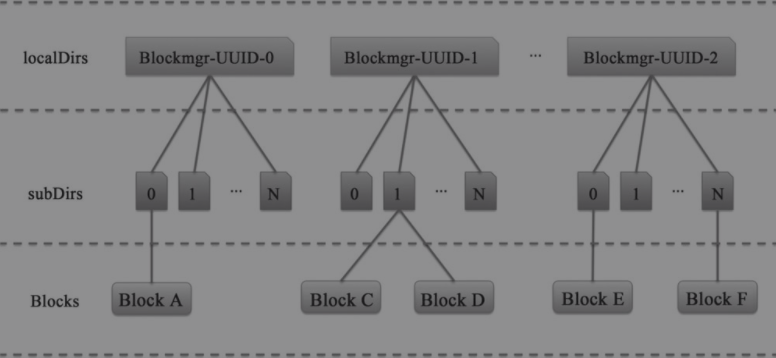介绍Spark中block的磁盘存储
DiskBlockManager
为逻辑block与数据写入磁盘的物理文件位置之间建立逻辑的映射关系
下面是成员属性
deleteFilesOnStop: 停止DiskBlockManager的时候是否删除本地目录subDirsPerLocalDir: 磁盘存储DiskStore的本地子目录的数量,由spark.diskStore.subDirectories参数指定,默认64localDirs: block落地本地文件根目录,由createLocalDirs()方法获取- 由
Utils.getConfiguredLocalDirs()获取到本地路径,默认获取spark.local.dir属性或者系统属性java.io.tmpdir指定的目录 - 由
Utils.createDirectory()方法在上一步获取到的各本地路径下新建以blockmgr-UUID为名的子目录
private def createLocalDirs(conf: SparkConf): Array[File] = { Utils.getConfiguredLocalDirs(conf).flatMap { rootDir => try { val localDir = Utils.createDirectory(rootDir, "blockmgr") logInfo(s"Created local directory at $localDir") Some(localDir) } catch { case e: IOException => logError(s"Failed to create local dir in $rootDir. Ignoring this directory.", e) None } } }- 由
subDirs: 二维File数组,表示本地目录和子目录名称的组合关系,为每个localDir生成subDirsPerLocalDir个子目录。private val subDirs = Array.fill(localDirs.length)(new Array[File](subDirsPerLocalDir))。下图所示目录的层级结构
shutdownHook: 为DiskBlockManager设置好关闭钩子
下面是成员方法
getFile(): 由文件名或者BlockId获取文件- 根据文件名的哈希值计算出
localDir和subDir - 由
localDir的synchronized进行同步,因为只有subDir才涉及到创建等线程不安全操作 - 如果
subDir没有则创建一个,返回一个在此二级目录下的文件
def getFile(filename: String): File = { val hash = Utils.nonNegativeHash(filename) val dirId = hash % localDirs.length val subDirId = (hash / localDirs.length) % subDirsPerLocalDir val subDir = subDirs(dirId).synchronized { val old = subDirs(dirId)(subDirId) if (old != null) { old } else { val newDir = new File(localDirs(dirId), "%02x".format(subDirId)) if (!newDir.exists() && !newDir.mkdir()) { throw new IOException(s"Failed to create local dir in $newDir.") } subDirs(dirId)(subDirId) = newDir newDir } } new File(subDir, filename) } def getFile(blockId: BlockId): File = getFile(blockId.name)- 根据文件名的哈希值计算出
containsBlock)():DiskBlockManager中是否有这个blockgetAllFiles(): 返回DiskBlockManager上所有的文件。为了保证线程安全,采用同步克隆的方式,所以返回的文件列表可能不是最新的def getAllFiles(): Seq[File] = { subDirs.flatMap { dir => dir.synchronized { dir.clone() } }.filter(_ != null).flatMap { dir => val files = dir.listFiles() if (files != null) files else Seq.empty } }getAllBlocks(): 调用了getAllFiles()方法,获取所有储存在磁盘上的block。可以看出block和文件是一一对应的def getAllBlocks(): Seq[BlockId] = { getAllFiles().flatMap { f => try { Some(BlockId(f.getName)) } catch { case _: UnrecognizedBlockId => None } } }createTempLocalBlock(): 创建保存中间结果的block和文件。createTempShuffleBlock(): 创建保存中间shuffle结果的block和文件。def createTempLocalBlock(): (TempLocalBlockId, File) = { var blockId = new TempLocalBlockId(UUID.randomUUID()) while (getFile(blockId).exists()) { blockId = new TempLocalBlockId(UUID.randomUUID()) } (blockId, getFile(blockId)) } def createTempShuffleBlock(): (TempShuffleBlockId, File) = { var blockId = new TempShuffleBlockId(UUID.randomUUID()) while (getFile(blockId).exists()) { blockId = new TempShuffleBlockId(UUID.randomUUID()) } (blockId, getFile(blockId)) }stop(): 正常停止DiskBlockManager,调用了doStop(),内部调用了Utils.deleteRecursively()删除所有localDirs目录以及下面的文件private[spark] def stop() { try { ShutdownHookManager.removeShutdownHook(shutdownHook) } catch { case e: Exception => logError(s"Exception while removing shutdown hook.", e) } doStop() } private def doStop(): Unit = { if (deleteFilesOnStop) { localDirs.foreach { localDir => if (localDir.isDirectory() && localDir.exists()) { try { if (!ShutdownHookManager.hasRootAsShutdownDeleteDir(localDir)) { Utils.deleteRecursively(localDir) } } catch { case e: Exception => logError(s"Exception while deleting local spark dir: $localDir", e) } } } } }
DiskStore
在磁盘上存储的block的底层管理器。
有以下重要属性
minMemoryMapBytes: 读取磁盘中的Block时,是直接读取还是使用FileChannel的内存镜像映射方法读取的阈值。由spark.storage.memoryMapThreshold指定,默认为2m。maxMemoryMapBytesblockSizes:ConcurrentHashMap[BlockId, Long]。保存BlockId和block大小的映射关系,保证线程安全diskManager:DiskBlockManager
有以下重要方法
getSize(): 在blockSizes中根据BlockId取出block大小contains(): 由DiskBlockManager.getFile()获取文件对象并判断是否存在put(): 调用给定回调方法writeFunc将对应的block写到磁盘中,并在blockSizes中加入BlockId和大小的映射关系,流关闭失败时调用remove()方法def put(blockId: BlockId)(writeFunc: WritableByteChannel => Unit): Unit = { if (contains(blockId)) { throw new IllegalStateException(s"Block $blockId is already present in the disk store") } logDebug(s"Attempting to put block $blockId") val startTime = System.currentTimeMillis val file = diskManager.getFile(blockId) val out = new CountingWritableChannel(openForWrite(file)) var threwException: Boolean = true try { writeFunc(out) blockSizes.put(blockId, out.getCount) threwException = false } finally { try { out.close() } catch { case ioe: IOException => if (!threwException) { threwException = true throw ioe } } finally { if (threwException) { remove(blockId) } } } val finishTime = System.currentTimeMillis logDebug("Block %s stored as %s file on disk in %d ms".format( file.getName, Utils.bytesToString(file.length()), finishTime - startTime)) } // 如果数据需要加密,则创建加密的channel,否则不加密 private def openForWrite(file: File): WritableByteChannel = { val out = new FileOutputStream(file).getChannel() try { securityManager.getIOEncryptionKey().map { key => CryptoStreamUtils.createWritableChannel(out, conf, key) }.getOrElse(out) } catch { case e: Exception => Closeables.close(out, true) file.delete() throw e } }putBytes(): 将ByteBuffer写入到磁盘中的一个block中,调用put()方法def putBytes(blockId: BlockId, bytes: ChunkedByteBuffer): Unit = { put(blockId) { channel => bytes.writeFully(channel) } }getBytes(): 由DiskBlockManager获取对应block的File实例,并封装成加密的EncryptedBlockData或者DiskBlockData返回。def getBytes(blockId: BlockId): BlockData = { val file = diskManager.getFile(blockId.name) val blockSize = getSize(blockId) securityManager.getIOEncryptionKey() match { case Some(key) => new EncryptedBlockData(file, blockSize, conf, key) case _ => new DiskBlockData(minMemoryMapBytes, maxMemoryMapBytes, file, blockSize) } }remove(): 由DiskBlockManager删除block文件和blockSize上的映射关系def remove(blockId: BlockId): Boolean = { blockSizes.remove(blockId) val file = diskManager.getFile(blockId.name) if (file.exists()) { val ret = file.delete() if (!ret) { logWarning(s"Error deleting ${file.getPath()}") } ret } else { false } }
REFERENCE
- Spark内核设计的艺术:架构设计与实现
文档信息
- 本文作者:wzx
- 本文链接:https://masterwangzx.com/2020/09/08/store-disk/
- 版权声明:自由转载-非商用-非衍生-保持署名(创意共享3.0许可证)